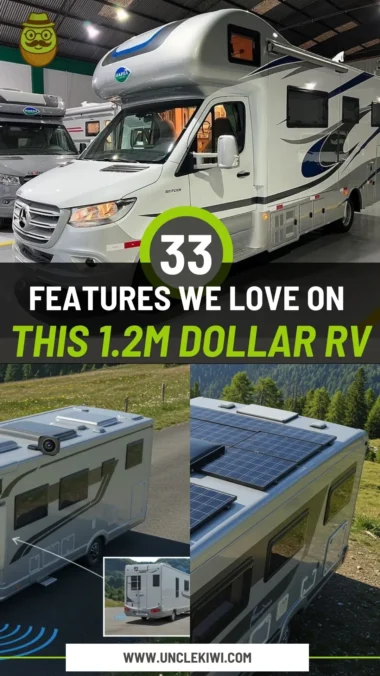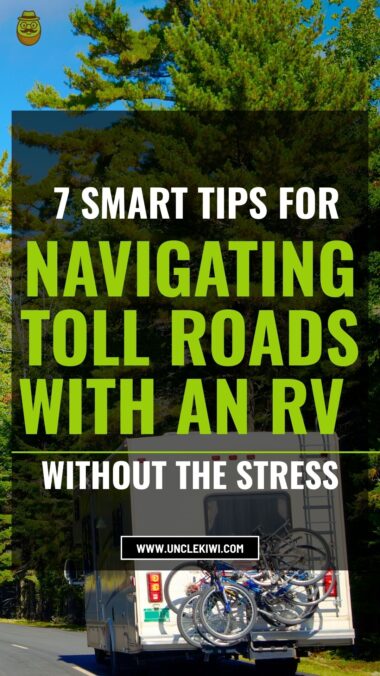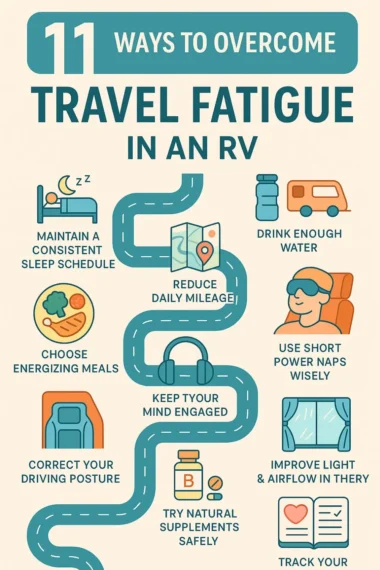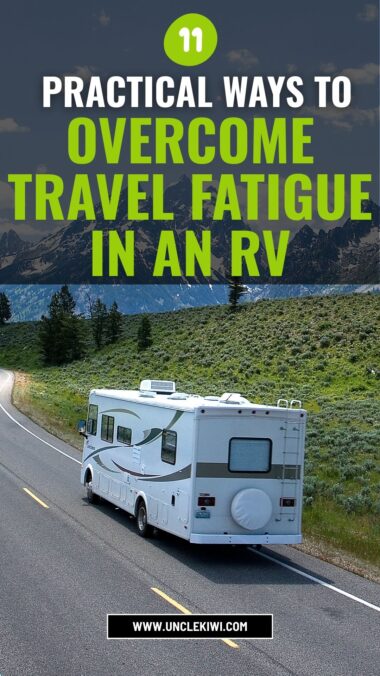9 Unexpected RV Life Realities That Hurt Remote Work Flow
The appeal of working remotely from an RV has grown in recent years as more professionals seek freedom from traditional office settings. According to the RV Industry Association, over 1.5 million Americans now work from RVs at least part-time, drawn by the promise of mobility, lower living costs, and connection to nature. While the flexibility of this lifestyle is a major selling point, it’s equally important to acknowledge the practical drawbacks.
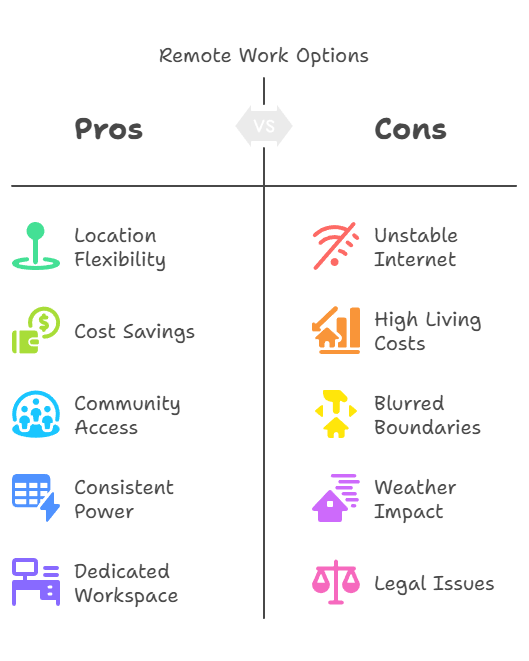
The reality of managing a career from the road can be far more complex than Instagram posts suggest. From unstable internet connections to maintenance surprises, the mobile office lifestyle presents a unique set of challenges. This article breaks down nine core disadvantages, with facts and real-world examples, to help remote workers decide if this lifestyle is the right fit for them.
Limited Internet Connectivity
Reliable internet access is essential for remote workers, but RV life often involves operating in areas with weak or non-existent coverage. Public campground Wi-Fi is notoriously slow and congested, often insufficient for video conferencing or large file transfers. Even when investing in mobile hotspots or cellular data boosters, service quality can drop significantly in remote or mountainous regions, creating serious disruptions to your workflow.
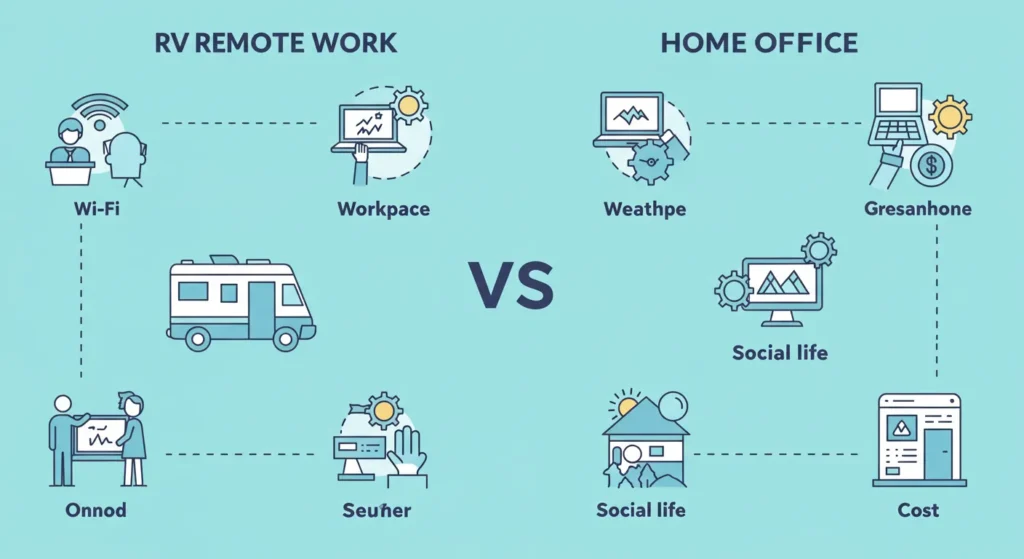
For those who rely heavily on consistent internet speeds for client communication, software development, or live streaming, this limitation becomes more than an inconvenience—it’s a critical failure point. Professionals often find themselves planning travel routes based on internet coverage maps rather than personal interests. According to a 2023 survey by the Mobile Internet Resource Center, 63% of full-time RV workers reported weekly connectivity issues that interfered with their job responsibilities.
Constant Maintenance and Upkeep
RVs, unlike stationary homes, are subject to continuous movement, which increases wear and tear. Regular maintenance includes oil changes, tire checks, and water system cleanouts, but unplanned issues such as plumbing leaks or malfunctioning solar panels are common. Environmental exposure to rain, snow, and extreme heat accelerates deterioration, requiring frequent inspections and repairs.

The cost and time investment required for maintenance can affect both productivity and finances. A 2024 report from RV Lifestyle Magazine found that full-time RVers spend between $2,000 and $4,500 annually on maintenance alone. Every mechanical delay—whether a failed generator or a broken slide-out—means potential missed deadlines or canceled workdays. Managing these interruptions requires advanced planning, emergency funds, and basic mechanical knowledge.
Limited Living and Working Space
Space constraints in an RV pose a serious challenge to productivity. Most RVs offer no more than 200 to 300 square feet, and that area is shared among living, dining, sleeping, and working functions. Without a designated workspace, remote workers often resort to folding tables or dinettes that are ergonomically unsuitable for long hours of computer use, leading to posture-related discomfort and fatigue.
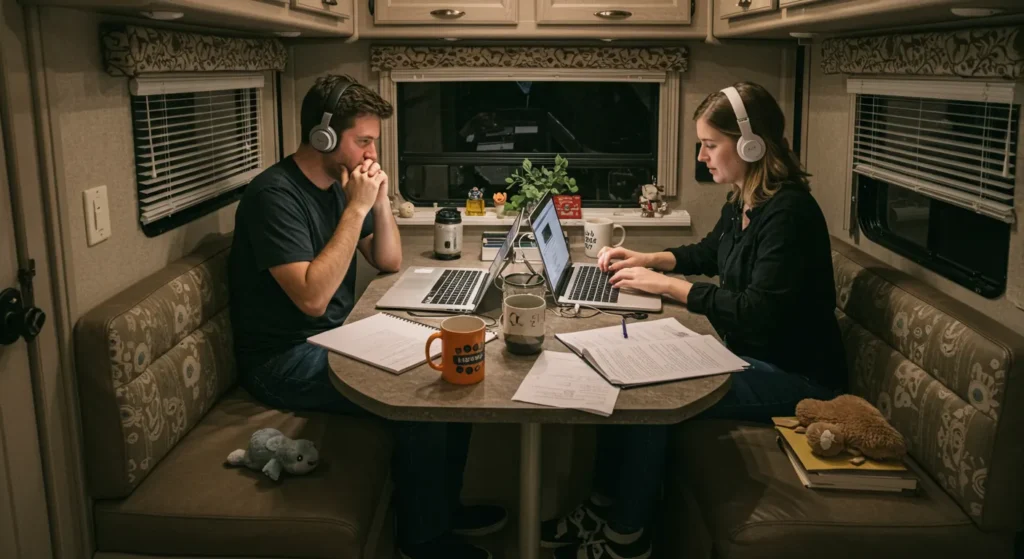
When sharing the space with a partner, family members, or pets, distractions and clutter further reduce the ability to focus. This tight environment can result in heightened stress levels, difficulty maintaining a professional demeanor during video calls, and reduced work quality. According to a 2023 report from the Remote Work Institute, lack of physical workspace is among the top three productivity barriers cited by mobile professionals.
Power Supply Instability
Unlike a home connected to a consistent power grid, RVs rely on a patchwork of energy sources: batteries, solar panels, and gas generators. Each has its limitations. Batteries may drain faster than expected during long workdays involving multiple devices, while solar panels depend on sunlight and perform poorly on cloudy days. Generators, although effective, are noisy and require regular refueling, which can be inconvenient or unavailable in remote areas.
This unstable power infrastructure means that remote workers must constantly monitor energy consumption and adapt their routines accordingly. Simple tasks such as charging a laptop or running a router can become logistical challenges. Without a robust and redundant energy setup, power failures can lead to lost work, missed meetings, and added anxiety—especially when deadlines are tight or client expectations are high.
Higher Living Costs Than Expected
Despite the common perception that RV living is cheaper, the full-time mobile lifestyle often incurs significant expenses. Campground fees can range from $30 to $100 per night depending on location and season. Fuel costs are also substantial; towing an RV can reduce fuel efficiency to as low as 10 miles per gallon. Add insurance premiums, repairs, internet subscriptions, and regular upgrades, and the monthly budget can quickly rival that of a fixed residence.
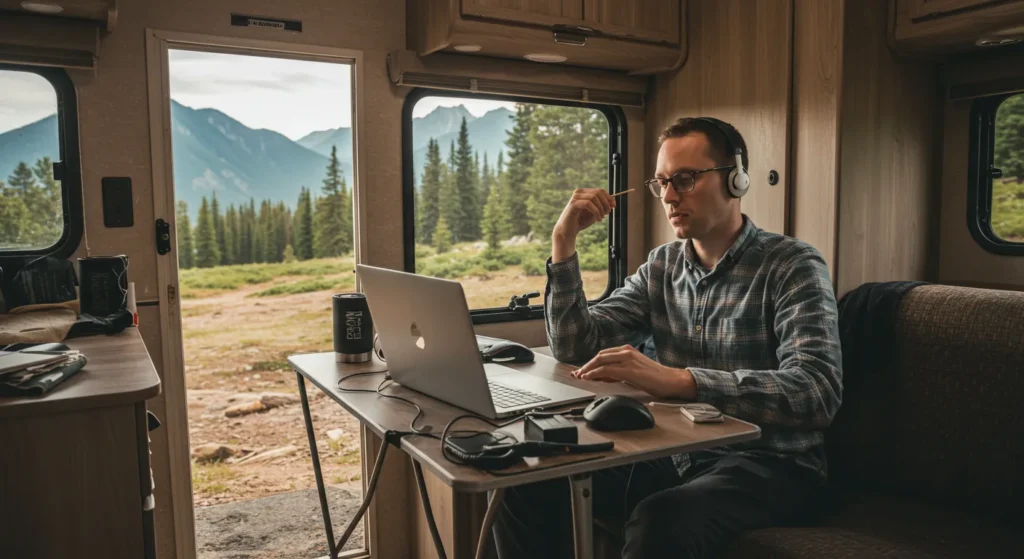
Data from the 2024 Full-Time RVer Financial Survey indicates that average monthly costs for a remote-working RVer range between $2,500 and $3,800. This figure can increase significantly when factoring in health insurance, vehicle registrations across multiple states, and periodic equipment replacements. Financial planning must account for these recurring and often unpredictable expenses to ensure long-term sustainability.
Social Isolation and Mental Fatigue
Working from an RV inherently limits face-to-face social interaction. As RVers move from place to place, they rarely stay long enough to build lasting friendships or participate in community events. Over time, this isolation can affect mental health and emotional well-being, especially for individuals who thrive on interpersonal connection.
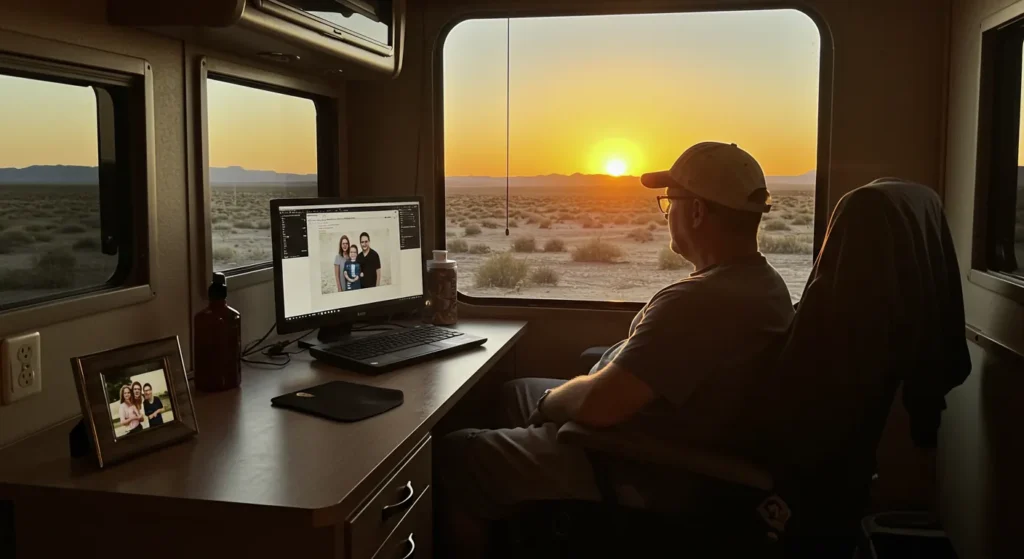
Additionally, the absence of coworking opportunities and professional networking can slow career growth. Frequent travel and shifting time zones make it difficult to maintain regular virtual check-ins with colleagues or clients. According to a 2023 Remote Worker Wellness Report, 41% of RV-based remote professionals experience increased feelings of loneliness compared to those working from stationary home offices.
Blurred Boundaries Between Work and Personal Life
RVs are designed for functionality, not compartmentalization. The same space serves as your bedroom, kitchen, living room, and office, making it nearly impossible to mentally separate work from leisure. Without clear boundaries, the workday tends to extend beyond regular hours, leading to burnout and dissatisfaction.
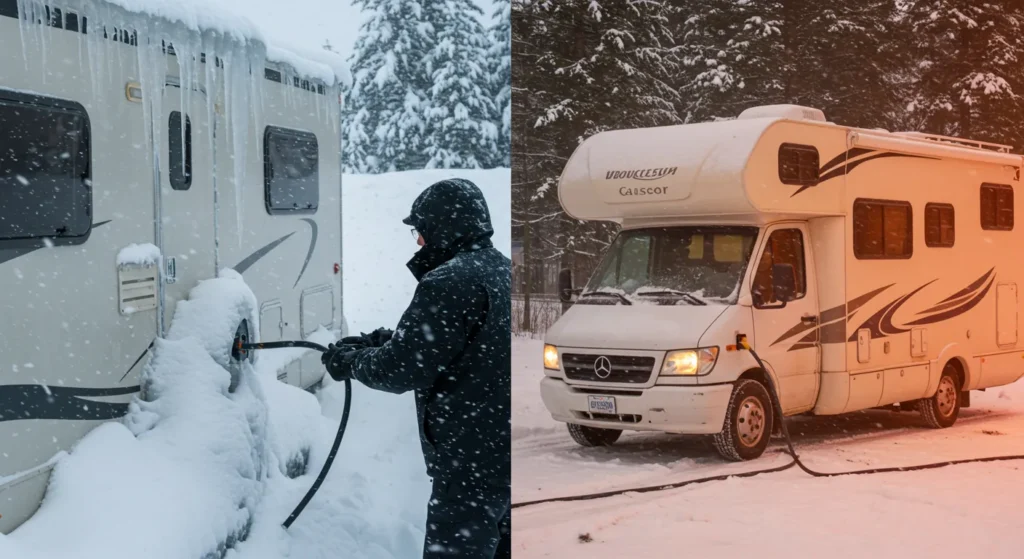
The constant presence of unfinished work in your living space also reduces downtime quality. Remote workers often report feeling like they’re “always at work,” which diminishes their ability to relax and recharge. Long-term, this lack of separation can negatively affect productivity, creativity, and mental health, leading many RVers to return to part-time or hybrid living models.
Legal and Regulatory Complexities
Working from an RV across state lines introduces a host of legal and administrative challenges. Tax regulations vary by state, and some jurisdictions may require non-residents to file state income tax if they stay beyond a specified duration. Additionally, many companies restrict where employees can perform their duties due to compliance or legal liability concerns.

Health insurance and vehicle registration further complicate matters. RVers often use mail-forwarding services and establish domicile in states like South Dakota or Florida to simplify these logistics, but this requires an understanding of state-specific laws. Without proper planning, remote workers may face legal penalties, revoked coverage, or loss of employment eligibility.
Vulnerability to Environmental Conditions
Unlike brick-and-mortar homes, RVs offer limited insulation and structural resilience against extreme weather. In summer, temperatures inside an RV can quickly exceed safe levels, while winter conditions risk freezing pipes and battery failure. These fluctuations not only create discomfort but also interrupt work schedules when attention must shift to survival and safety.
Unpredictable weather can delay travel plans, isolate you in areas without signal, or force extended stays at costly campsites. Equipment such as solar panels or satellite dishes may become ineffective under adverse conditions, requiring backup systems that add weight and cost. For digital professionals whose income depends on consistency, these environmental factors pose a serious liability.
At a Glance: Working Remotely from an RV vs. Traditional Remote Work
| Factor | RV Remote Work | Traditional Home Office |
|---|---|---|
| Internet Reliability | Often unstable; depends on location and hardware | Typically stable with broadband or fiber |
| Monthly Living Costs | $2,500 – $3,800 (varies with travel & site fees) | $1,800 – $3,200 (varies by rent and utilities) |
| Work-Life Balance | Blurred; limited space separation | Easier to define with physical office setups |
| Power Availability | Relies on solar/generator; weather-dependent | Consistent grid connection |
| Workspace Size | Compact; multi-functional areas | Dedicated room or desk |
| Legal Complexity | Multi-state taxes, residency issues | Straightforward within one jurisdiction |
| Social Interaction | Minimal; often isolated | Access to community and coworking spaces |
| Weather Vulnerability | High; impacts mobility and work hours | Low; insulated living environment |
| Maintenance Costs | $2,000–$4,500 annually | Minimal for renters/homeowners with landlord |
Final Thoughts
Working remotely from an RV combines freedom and flexibility with significant logistical and financial challenges. From unstable internet and limited space to legal complications and weather vulnerability, the mobile work lifestyle demands more planning, adaptability, and discipline than most anticipate. Understanding these nine cons in detail empowers professionals to make informed decisions about whether this lifestyle aligns with their career needs and personal preferences.
Those considering the leap into RV-based remote work are advised to conduct a trial period, track costs meticulously, and secure redundancy for all essential services. Only then can the romanticism of life on the road be matched with the stability required for professional success.
Frequently Asked Questions About Working Remotely From an RV
Is RV internet reliable enough for full-time work?
Internet reliability depends heavily on your setup and location. While satellite options like Starlink improve coverage, speeds can still lag behind city-based fiber connections, especially in bad weather or remote areas.
How much does it cost monthly to live and work from an RV?
On average, full-time RVers working remotely spend between $2,500 to $3,800 per month. Costs include campground fees, fuel, maintenance, internet, insurance, and food—similar or higher than many stationary setups.
Can I legally work from any state while living in an RV?
Not always. You may be required to file taxes in certain states where you spend extended time. Additionally, some employers have limitations due to state labor laws or insurance rules, so always check before moving.
What are the biggest technical requirements for remote work in an RV?
You’ll need a high-powered hotspot, a data plan with nationwide coverage, solar or generator backup, and a dedicated workspace—even if it’s compact. Investing in these essentials is critical to staying connected.
Is it easy to maintain a work-life balance in an RV?
No, it’s often difficult. Limited space makes it hard to disconnect from work. Since your desk might double as your dinner table or bed, it can feel like you’re always on the clock unless strict routines are in place.
What do people do about mail and packages on the road?
RVers typically use mail-forwarding services like Escapees, MyRVMail, or Traveling Mailbox. These services scan, forward, or hold your mail, and some offer street addresses for legal residency purposes.
How do you handle emergencies like breakdowns or medical issues?
Breakdowns are common, so it’s important to carry tools, have roadside assistance like Good Sam, and maintain an emergency fund. For healthcare, nationwide insurance plans and telehealth services are popular among nomads.
Is RV living suitable for families with children or pets?
Yes, but it adds complexity. Space becomes tighter, and education or pet care must be adapted to the mobile lifestyle. Many traveling families homeschool and select pet-friendly campgrounds with open play areas.
How do remote RV workers stay mentally healthy and socially connected?
Maintaining regular video calls with friends, joining online communities like RVillage or Escapees, and attending RV meetups help combat loneliness. Many RVers plan their routes around visits with family or community events.
Can you deduct RV expenses on taxes if you work remotely?
If you’re self-employed, some costs like internet, office space, and mileage may be deductible. However, full deductions for RV-related expenses require strict documentation and typically don’t apply to W-2 employees.


